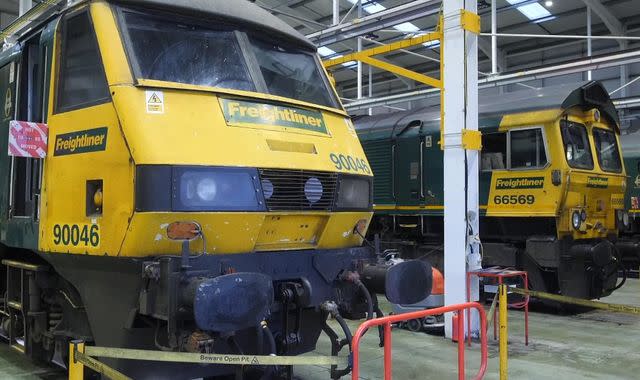Electric trains are the future for green freight but costs are forcing firms back to diesel

Walking through the steel-walled canyons of a container yard feels good.
I enjoy the mystery of what they hold and where they're going.
Forty-tonne boxes from all over the world are stacked high all around - emblazoned on the outside with shipping name brands - Maersk, Evergreen, One - revealing nothing of what lies within.
"It could be anything you imagine, but I know some of these contain cereal, expensive cars and even wine in giant bladders. And this lot is on its way to the port of Felixstowe."
The man revealing the secrets is Tim Shoveller, CEO of Freightliner UK, speaking at their Manchester terminal.
It's right beside the so-called "Theatre of Dreams" - Manchester United's Old Trafford football ground.
Tim's dream is to get more stuff off of trucks and onto trains.
"Rail freight takes about six million HGVs off the road, and we want to triple that," he says.
The problem with rail freight
Alongside reducing congestion for drivers, rail haulage is much more climate-friendly - cutting carbon emissions by around three quarters compared to road, and even more if the trains are electric.
But here's the problem - electricity is so expensive compared to diesel that operators are reaching for fossil-fuelled locomotives.
In August this year, rail freight operator DB Cargo UK announced the permanent retirement of its electric fleet and even Tim had to temporarily sideline electric trains earlier this year.
He says: "We had to put diesel back on because of the price of electricity. It was costing us over one thousand pounds extra per train and was simply not viable."
He'd like to see a cap on electricity prices for freight trains that stops them rising above diesel.
In Germany, such a policy exists, and they carry double the proportion of goods by train: 20%.
'Electric is the future' - despite HS2 setback
We climb aboard an electric Class 90 and meet Duncan Allan, the driver.
"It's nice, comfortable, quiet, and gets up to speed faster than diesel. It's the future," he says.
We ride in the cab as we weave our way through central Manchester and on towards Crewe.
Only 9% of freight currently moves this way in Britain - and our ageing infrastructure hinders growth - with freight and passenger trains jostling for space.
Click to subscribe to ClimateCast with Tom Heap wherever you get your podcasts
According to Tim, the cancellation of HS2 north of Stafford will make this much worse.
"It's a real problem for freight, and our aspiration to triple freight," he says.
"The busiest part is between Stafford and Crewe, so having HS2 only going that far [to Stafford], we'll continue competing with passenger trains, and that limits the amount we can run."
Never been a better time to switch to rail
The government says it is not planning to cap electricity costs for rail freight but points to grants offered to seaports to incentivise shipping onwards with more rail and less road, which it claims have reduced HGV journeys by one million in two years.
Rail Minister, Huw Merriman, also says the government welcomes discussions on how to shift specific bottlenecks and open up capacity.
"The long-term future for the movement of freight needs to be by electrification and that's why the government has used taxpayers' money to electrify 1,200 miles of track in the last 12 years," he says.
Read more from Sky News:
UK's first air capture plant is turned on
How rising temperatures will affect our transport network
While a completely decarbonised railway is some way down the tracks - it's already much greener than road.
And with electric lorries way behind electric cars - and our roads more congested than ever - there's perhaps never been a better time to get stuff off the road and onto rails.

 Yahoo News
Yahoo News 
